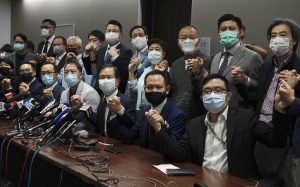As of November 11, Hong Kong’s legislative effectively has no opposition force. The entire pro-democrat camp – 19 members of Hong Kong’s 70-seat Legislative Council (LegCo) – resigned after four of their number were ousted by the executive branch.
“Today we will resign from our positions because our partners, our colleagues have been disqualified by the central government’s ruthless move,” Wu Chi-wai, the leader of the pro-democracy camp, told reporters.
“There is separation of powers under the Basic Law, but today, the central government’s decision means separation of powers will be taken away. All the power will be centralized in the chief executive – a puppet of the central government. So today is the end of ‘one country, two systems’.”
On November 11, the National People’s Congress Standing Committee in Beijing passed a resolution on the “legal requirements and preconditions” for holding a seat in Hong Kong’s legislature. The decision listed four conditions that would disqualify someone for serving in LegCo. As enumerated by NPC Observer, they include:
advocating or supporting the notion of “Hong Kong independence”; refusing to recognize China’s sovereignty or exercise of sovereignty over Hong Kong; seeking foreign or overseas forces to interfere in Hong Kong affairs; and otherwise endangering national security.
Chinese Foreign Ministry spokesperson Wang Wenbin defended the NPCSC resolution as “a justified and legitimate decision that conforms to the Constitution and other laws.” Wang told reporters, “It is a necessary step to uphold and improve the system of ‘one country, two systems’, implement the Basic Law and the Hong Kong national security law, and maintain the rule of law and constitutional order in the HKSAR,” referring to the Hong Kong Special Administrative Region.
The decision further squeezed the space for political opposition in Hong Kong, following the July 1 imposition of a national security law on the territory by Beijing.
Immediately after the NPCSC decision, Hong Kong’s government announced that four pro-democrats had been disqualified from their LegCo seats. The four –Kwok Ka-ki, Dennis Kwok, Kenneth Leung, and Alvin Yeung – had previously been banned from running in the next LegCo election, but had originally been permitted to keep their seats in the interim. Based on the November 11 decision, however, their expulsion is retroactive – meaning their votes on any issues as of July 30, 2020 will be voided. (The 15 lawmakers resigning by choice will not have any past votes negated.)
Hong Kong Chief Executive Carrie Lam confirmed on Wednesday that the seats vacated by the pro-democrats will remain open until the next LegCo elections are held in September 2021.
Hong Kong was originally supposed to hold legislative elections in September of this year, but they were postponed by a year due to the COVID-19 pandemic. The delay was widely denounced by pro-democrats at the time, and the camp reportedly mulled resigning en masse in protest of the delayed election. They eventually decided to remain in LegCo – until now.
Prominent pro-democracy legislator Claudia Mo explained the rationale behind the mass resignations. “It’s no longer rule of law. It’s not even rule by law. It’s rule by decree,” Mo said, according to the Hong Kong Free Press. “From now on, anyone they [believe] to be politically incorrect, unpatriotic or simply not likeable to look at – they could just oust you using every means… They wouldn’t even let you run.”
While the legislators are “quitting this term, this legislature,” she added, “We are not quitting Hong Kong’s fight.”
Meanwhile, Lam defended the decision to disqualify four pro-democrat lawmakers. “We cannot allow members of the Legislative Council who have been judged in accordance with the law to be unable to fulfill the requirements and prerequisites for serving on the Legislative Council to continue to operate in the Legislative Council,” she told reporters on November 11. Lam explained that, following the decision to bar the lawmakers from running for re-election, she had sought the NPCSC’s guidance on eligibility criteria for serving in LegCo.
She also rejected the premise that LegCo will now become a “rubber-stamp” body after the mass resignations, saying that “there are many occasions even among the so-called pro-establishment members that our proposals did not get through.”
The resignations leave only two lawmakers not in the pro-Beijing camp in the LegCo: Pierre Chan, who represents the medical sector’s functional constituency, and Cheng Chung-tai of the locality party Civic Passion. Chan said he was disappointed in the ouster of the four pro-democrats, but was determined to stay in the legislative council to assist in the COVID-19 fight. Cheng, meanwhile, said that he would have joined a mass resignation earlier, following the delayed elections, but said leaving in protest would have no impact at the moment.

































